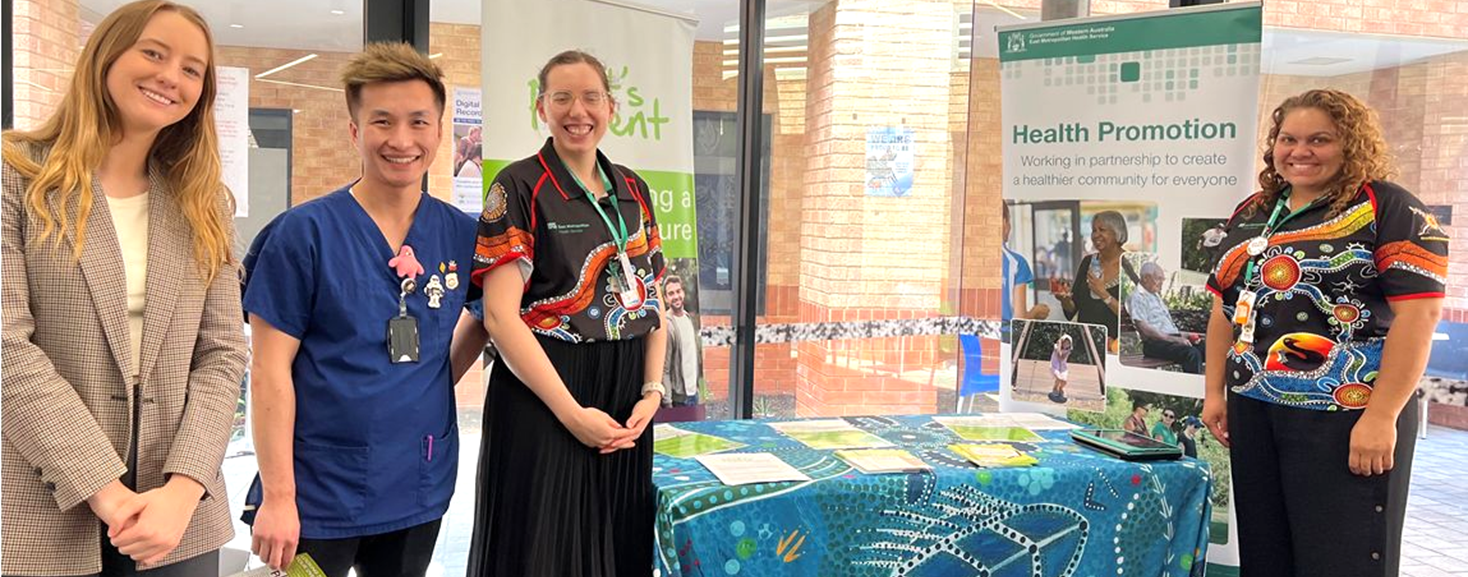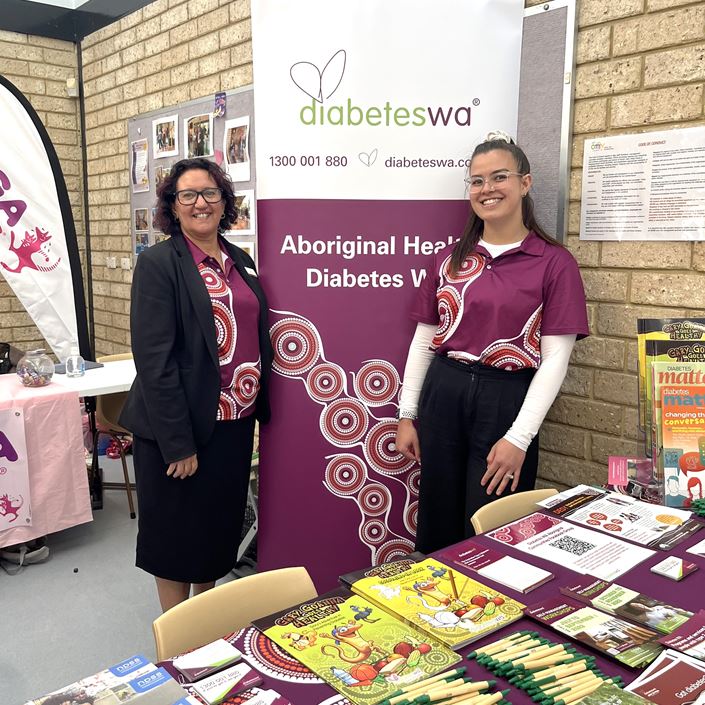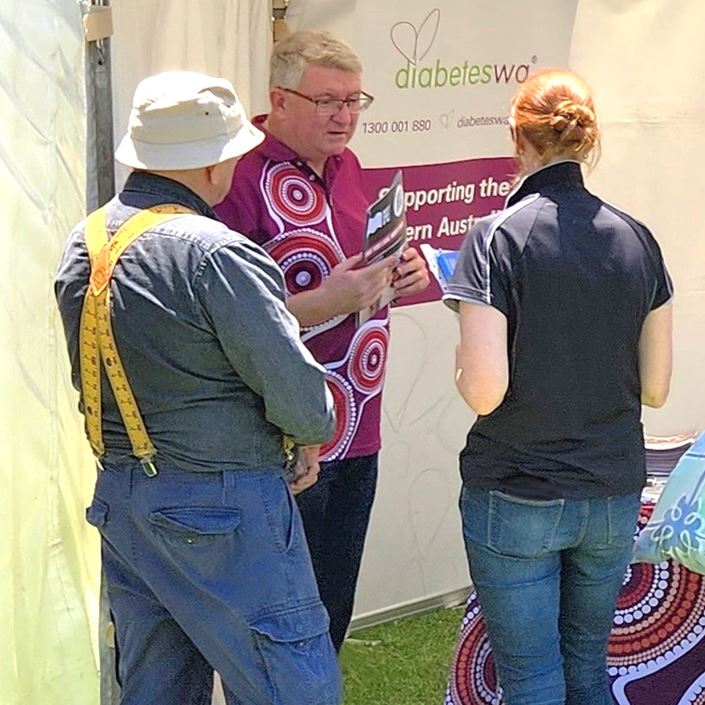Diabetes prevention program goes online with digital trial
After establishing the free face-to-face ‘Let’s Prevent’ program in Western Australia’s South West, Diabetes WA received Lotterywest funding to pilot a digital version using a model from the Leicester Diabetes Centre (UK).
Supported by the WA Department of Health, the Diabetes WA ‘Let’s Prevent’ face-to-face program puts people at risk of developing type 2 diabetes, heart disease or stroke on a path to better health and wellbeing.
The program informs, inspires, and motivates participants to make small changes that can have a big impact on their lives. It encourages participants to set meaningful health goals in regard to regular exercise, eating a healthy diet, living smoke-free and acting on preventative health care.
The digital version of 'Let's Prevent' was the focus of a six-week trial in 2021 after being reshaped as a web-based application for smart phone, tablet or desktop.
To transform the free face-to-face Diabetes WA health and wellbeing program ‘Let’s Prevent’ for people at risk of Type 2 diabetes and cardiovascular disease and trial it as a digital pilot version.
Diabetes WA
2/1/2021
$478,519
Lotterywest
$478,519
Western Australia's South West
People at risk of developing type 2 diabetes, heart disease or stroke in Western Australia's South West.
- All participants preferred the Let's Prevent digital program to the face-to-face version, as it was easier to use in their own time and at their own pace. In addition, those using the digital version considered it more accessible, flexible, and less information heavy
- Participants also found the chat forum a good replacement for the social aspect of the face-to-face sessions
- After the successful digital trial, the East Metropolitan Health Service - which includes Royal Perth Hospital, the Armadale Health Service and Kalamunda Hospital - implemented the ‘Let’s Prevent Digital Program’ as an employee wellness initiative in 2023 with more than 100 staff since taking part.
- Participants rated the program highly, as they felt it helped them focus on their goals and found it motivating and easy to use.
- In comparison to the face-to-face program, the digital version of Let’s Prevent was the preferred option as participants found it more accessible, flexible, and less information heavy.
- According to participants, the chat forum in the digital version was considered a good replacement for the social aspect of the face-to-face sessions.
- Use of the already established digital ‘Let’s Prevent’ program from the UK was a win, as it translated well for the WA market with some content adaptation and helped to streamline the development process.
- In the pilot round, the reasons why people did not engage with the program related to low digital literacy and higher level of education. It was recommended that the program be advertised as fit for use by people with general education and higher digital literacy. When applying for future grants, multiple strategies would need to be employed and funded within the grant to ensure equity of access was not limited by digital literacy.
- Some difficulties in encouraging participants to engage in the pilot program was counteracted with Diabetes WA using a donated gift basket from its organisational member partners to help boost recruitment. More strategies to increase the diversity of consumers signing up would form part of future projects.
- Many people in the trial round reported technical issues with the booster sessions not changing to "complete" status, instead remaining in "continue" status.
Opportunity
Diabetes is regarded as Australia’s fastest growing chronic disease and in Western Australia alone, it is estimated that 30 people are diagnosed with the disorder every day. In 2024, more than 148,000 people in Western Australia are living with diabetes.
Diabetes WA works to educate, inform, support and advocate on behalf of the thousands of West Australians living with diabetes.
Supported by the WA Department of Health, Diabetes WA established a free face-to-face ‘Let’s Prevent’ program in the state's South West for people at risk of developing type 2 diabetes, heart disease or stroke. The program provides practical information, skills, and support to participants so they can take steps to avoid a chronic condition in the future.
Diabetes WA secured Lotterywest grant funding in 2021 to pilot a digital version of its ‘Let’s Prevent’ using a model from the Leicester Diabetes Centre (UK).
As type 2 diabetes can largely be prevented with a healthy lifestyle, the ‘Let’s Prevent’ program offers a valuable way of encouraging participants to maintain a healthy weight, eat a healthy diet and take part in regular physical activity.
A digital version provided opportunities to reach more people during COVID 19 pandemic restrictions, help expand Diabetes WA’s reach through regional and remote WA, and appeal to younger at-risk groups more likely to engage digitally.
Approach
When seeking Lotterywest funding for a digital pilot version, Diabetes WA was in the process of rolling out its face-to-face version of ‘Let’s Prevent’ in the state’s South West with funding from WA Health.
At the time, there was significant interest from the public and health professionals to pivot to a digital option with the COVID 19 pandemic continuing to impact the state.
Organisers planned to recruit 50 people for the online trial including a group of 25 previously involved in the face-to-face version.
A total of 168 people ultimately registered for the digital pilot round, which were mostly middle-aged Australian females, with half of those who registered (84) actively engaging with the program.
To be eligible, participants needed to be aged 18 plus, not living with diabetes, not pregnant and not part of another lifestyle study.
Using a model from the Leicester Diabetes Centre (UK), the content of the digital version was adapted from the face-to-face version to seven core learning sessions, along with a weekly booster learning session.
Learning sessions included the topics of Managing Your Weight and Healthy Eating, while booster sessions covered Healthy Snacks and Drinks, Label Reading and more. By the end of the trial, the topics of Diabetes and Healthy Eating proved the most popular.
The digital platform also featured a decision-making tool that helped participants make personalised and achievable goals, along with a chat forum option, and a private chat portal to pose questions to a health professional.

84
People engaged with the pilot digital program
3655
Number of log-ins during the trial period
5
Average number of kilometres walked by participants each day
Impacts and outcomes
During the six-week trial period, the 84 participants logged in on average 21 times, with those regarded as actively engaged averaging 28 log-ins, resulting in a total of 3655 logins across the pilot round.
Participants walked an average of 5km each day, and reported an improved focus on their health goal.
More than 90 per cent of those who took part continued to engage with the program after the trial was complete, and most indicated that they would use the program for more than a year.
It was recommended that Let’s Prevent Digital be rolled out to a wider population through social media with the inclusion of additional information on topics aimed at helping prevent diabetes.
In 2023, the East Metropolitan Health Service - which includes Royal Perth Hospital, the Armadale Health Service and Kalamunda Hospital - implemented the ‘Let’s Prevent Digital Program’ as an employee wellness initiative with more than 100 staff since taking part.



“I signed up for the Let's Prevent program and saw it through to the end. I (now) have more confidence and enjoy buying clothes, which I used to hate due to my size. I will never go back to the way I was; I actually like me these days which is awesome. Diabetes will never get me!”
Participant testimonial
What worked
Participants rated the program highly, as they felt it helped them focus on their goals and considered it motivating and easy to use.
All participants preferred the Let's Prevent digital program to the face-to-face version, as it was easier to use in their own time and at their own pace. In addition, those using the digital version considered it more accessible, flexible, and less information heavy.
Participants also found the chat forum a good replacement for the social aspect of the face-to-face sessions.
Taking advantage of existing programs was valuable, as the established digital ‘Let’s Prevent’ program from the UK translated well for the WA market with some content adaptation and helped streamline the development process.
Key challenges
Considerations When Moving to a Digital Space
- When branching out into the digital health space, it was a benefit having existing in-house digital capabilities and experience to make it an easier process.
- Ideally, digital innovations should have the capability to integrate with existing organisational software, to avoid significant change management impacts on organisational operations.
- It can be difficult to encourage participants to engage in pilot programs. Low-cost incentives for participants can boost recruitment. Diabetes WA used a donated gift basket from its organisational member partners that made a significant difference to recruitment for the pilot.
- Digital programs are not a ‘set and forget’ and require continual monitoring, nudging strategies, and content refresh to keep participants engaged and continuing to interact with the program.
Boost Consumer Buy-In
- Consumer involvement is the key to ensuring a digital program meets the needs of the target group.
- Diabetes WA had consumers involved in the user acceptance and piloting of the program, which was invaluable, but strategies to increase the diversity of consumers signing up would form part of future projects.
- Some consumers require support to engage with digital health programs. When applying for future grants, multiple strategies would need to be employed and funded within the grant to ensure equity of access is not limited by digital literacy.
Learn about wellbeing
Understand how your community is going to help you to better target and plan your project.
Ready to plan your project?
Understand your vision, plan your impact and report on the outcomes of your project with three easy interactive tools in the Community Impact Planner.
Acknowledgement of Country
The Western Australian Community Impact Hub acknowledges and pays respect to the Traditional Owners of the land on which we are based, the Whadjuk people of the Noongar Nation and extends that respect to all the Traditional Owners and Elders of this country. We recognise the significant importance of their cultural heritage, values and beliefs and how these contribute to the positive health and wellbeing of the whole community.


